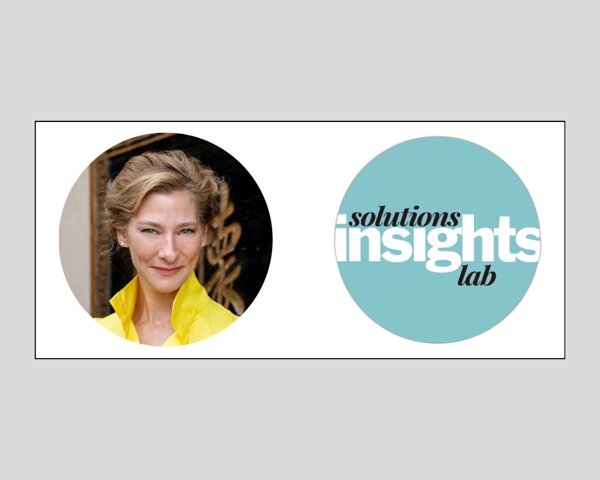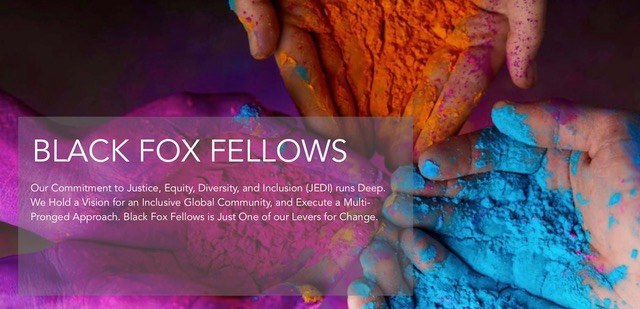The interview series was created through a partnership between the Skoll Foundation and Solutions Insights Lab, an initiative of the Solutions Journalism Network, informed by their shared interest in identifying and interrogating what’s working — and what’s not — in the field of social innovation and supporting research and dialogue to advance problem-solving knowledge.
It was a thrill for Black Fox founder, Natalie Rekstad, to be interviewed on site by Catherine Edwards on April 14, 2023 in Oxford, England during the Skoll World Forum. Read the interview on the ‘What’s Working’ site here, or read on below!
Interview with Natalie Rekstad (Black Fox Philanthropy)
Catherine Edwards: You said before that you’re the only ones in the world doing this. I was wondering what kind of insights or lessons you’ve learned that others who want to get into this work could learn from?
Natalie Rekstad: We’re the only one that I’m aware of after all these years doing this in this way – the “outsourced fundraising department” model. At its core fundraising is highly relational by nature. Yes, there are a lot of technical skills and artistry that go into it with research and messaging, but at the end of the day, we’re all human, and funders also have a hero’s journey. Our deepest passions often spring from our deepest wounds, so they’re very often in the mission with a level of heart and ferocity as much as the NGO leaders. It’s important to honor and respect that because being treated like a walking dollar sign is incredibly off-putting and ineffective in engaging anyone.
The biggest thing that I would share that could shift things enormously is how the NGO leaders go into those conversations with funders, taking their full space in the room, owning their worth and trusting in their own North Star. When they’re going into those meetings, if they’re going in with a dynamic of, “You’re a funder. We need money. You’re up here, and I’m down here,” you’re actually creating a dynamic most funders want nothing to do with. Kevin Starr from Mulago Foundation wrote an article in 2016, but I still reference it, called The Pitch is Dead: Long Live the Conversation. It’s about going back to that human level, understanding the funder’s journey, and why they care as deeply as you do about the mission.
If I could impart one thing and shift how we relate to each other as we’re moving in this space, it is that the NGO leaders should truly take up their full space in the conversation as the equals that they actually really are, recognizing they are coming at the solution from a different angle, but that it is as valid and vital as the funder in the conversation.
Catherine Edwards: Do you have examples of what that can look like, maybe if a NGO wasn’t sure if they’re achieving that or still creating this dynamic? What does it look like when you’re doing that?
Natalie Rekstad: Funders come alive when we’re working with other people who are coming alive in the work. When you’re coming at it as, “I’m spraying you with a pitch. I’m reading cues that you’re going walls up, so I’m going to tap dance even faster. But now I’m on eggshells, tap dancing faster.” You get farther and farther away from each other when, instead, you could show up in that conversation differently and see each other with humanity and curiosity. It may or may not be yours to do together, but at least embodying your own dignity and self-respect is an important piece in how you are showing up in the relationship, and what you have to offer.
I’m not saying that some gatekeepers aren’t on ego trips or that it’s always 100% clean. There’s also fundraising as BIPOC, so I’m not sweeping some things under the rug, but I do know that, for the most part, the funders in my community want no part of an unhealthy power dynamic. They want to be in relationship, and feel the trust. Are we going to move the trust a millimeter, an inch, or go the distance now, really leaning in? a Or am I feeling the need to lean away?
Catherine Edwards is a journalist and content strategist based in the UK, having also lived and worked in Germany, Italy, Sweden and Austria. She supports newsrooms and mission-driven organisations with content strategy, audience development and constructive journalism.
* This interview has been edited and condensed.







